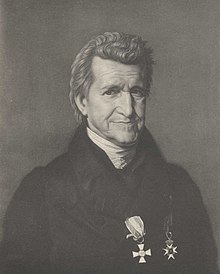bio.wikisort.org - Researcher
Christian Ehrenfried von Weigel (24 May 1748 – 8 August 1831) was a Swedish-born German scientist and, beginning in 1774, a professor of chemistry, pharmacy, botany, and mineralogy at the University of Greifswald.
Christian von Weigel | |
|---|---|
 | |
| Born | Christian Ehrenfried Weigel 24 May 1748 Stralsund, Swedish Pomerania, Sweden |
| Died | 8 August 1831 (aged 83) Greifswald, Province of Pomerania, Kingdom of Prussia |
| Nationality | German |
| Education | University of Göttingen (M.D., 1771) |
| Scientific career | |
| Fields | Chemist, botanist |
| Institutions | University of Greifswald |
| Doctoral advisor | Johann Christian Erxleben |
| Doctoral students | Karl Rudolphi |
| Author abbrev. (botany) | Weigel |
Biography
Born in Stralsund, in 1771 he received his medical doctorate from the University of Göttingen, having studied under Johann Christian Erxleben. In 1806, Weigel was ennobled and carried from then on a von in his name. He became the personal physician of the Swedish royal house two years later. Among other things, Weigel developed a cooling heat exchanger (German Gegenstromkühler) (1771), which was later improved upon by Justus von Liebig and then became known as the Liebig condenser (Liebigkühler). Furthermore, the honeysuckle genus Weigela is named after him.
In 1792, he was elected a foreign member of the Royal Swedish Academy of Sciences.
References
- IPNI. Weigel.
External links
- Weigel biography
- Christian Ehrenfried Weigel at the Mathematics Genealogy Project
- Christian Ehrenfried Weigel in the German National Library catalogue
- Literature about Christian Ehrenfried Weigel in the State Bibliography (Landesbibliographie) of Mecklenburg-Vorpommern
- "Author Details for Christian Ehrenfried Weigel" (HTML). International Plant Names Index. International Organization for Plant Information (IOPI).
- Carl von Linné; Christian Ehrenfried Weigel. "Correspondence".
На других языках
- [en] Christian Ehrenfried Weigel
[ru] Вайгель, Кристиан Эренфрид
Кристиан Эренфрид Вайгель (нем. Christian Ehrenfried Weigel[2][3][4] или нем. Christian Ehrenfried von Weigel[2][3][5], 2 мая 1748 — 8 августа 1831) — немецкий[3][4][6] ботаник[3], профессор ботаники[3][5][6], миколог[2], химик[3], профессор химии[3][5], а также врач[3] и доктор медицинских наук[4][5].Другой контент может иметь иную лицензию. Перед использованием материалов сайта WikiSort.org внимательно изучите правила лицензирования конкретных элементов наполнения сайта.
WikiSort.org - проект по пересортировке и дополнению контента Википедии